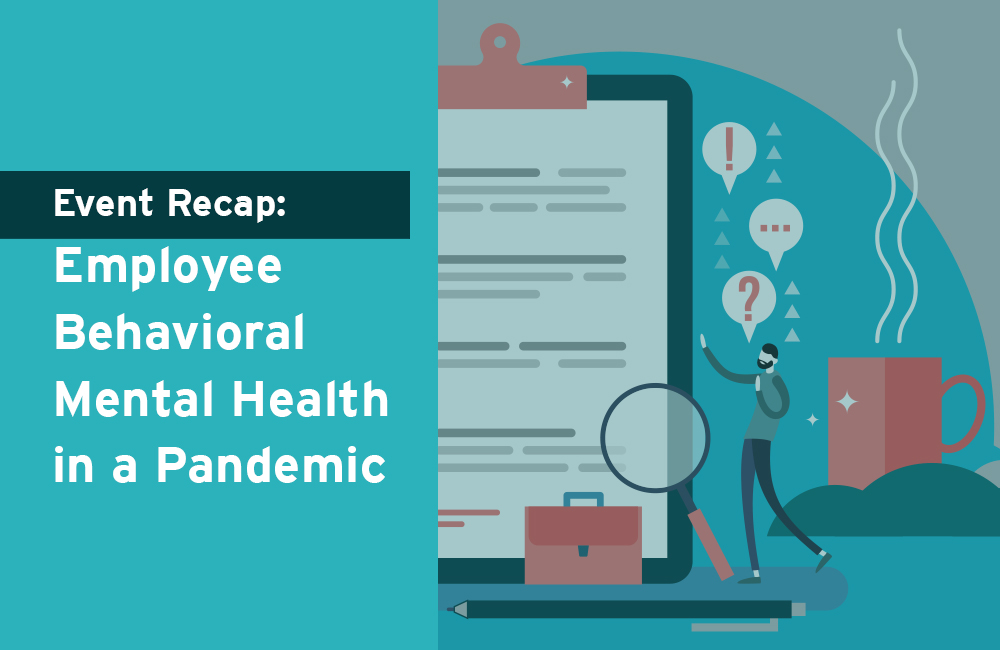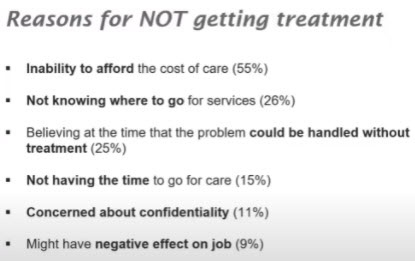
Employee Behavioral Mental Health Resources: Event Recap
This is a blog recap of a virtual event held on April 26. Click here to view the full webinar recording. Click here to skip to the Employer Resources section.
To begin the webinar, Kyle Monroe, Vice President of Network Development & Provider Relations, explained that The Alliance is placing added emphasis on behavioral mental health during the pandemic, and as a result, has contracted with over 110 behavioral mental health providers (850 clinicians) over the past year alone. What’s more, all of those contracts are based on a percentage of Medicare using Reference-Based Contracting by The Alliance. Kyle then introduced Dr. Jerry L. Halverson, Chief Medical Officer at Rogers Behavioral Health, to discuss data points employers can use to improve their awareness and mental health offerings.
Why Mental Health Matters for Employers
Dr. Halverson began his portion of the event by highlighting why behavioral mental health matters to employers:
- Mental health costs employers $500 billion/year due to disability, absenteeism, presenteeism, lost productivity, and more. Mood disorders are the most common cause for hospitalization in the US for people under age 45, and more than 17 million people had at least one major depressive episode over the past year.
- Last year, 1 in 5 people experienced a mental illness, 1 in 10 experienced a substance abuse disorder, and 1 in 20 had both. (Almost 74% of those with a substance abuse order struggled with alcohol addiction.)
- Mental health treatment is effective, but many don’t seek it. 60% of adults with mental health illness did not receive mental health services in the previous year, while 80% of individuals with depression, when treated, fully recover. Pursuit of treatment is lacking due to a variety of reasons including stigma, cost, and loss of job (and subsequently health insurance).
- Further, people seeking treatment face barriers in accessing providers due to facility closures and a shift from in-person care to telemedicine care – which, as Dr. Halverson explained – is not always the best choice for every mental health disorder.
- When treated, 86% of people report improved work performance, 80% report “high levels of work efficacy and satisfaction,” and 40-60% report a significantly reduced rate of absenteeism.
- Mental illness can impact physical health as well, increasing the risk of heart disease, stroke, diabetes, and some forms of cancer. As self-funded employers know well, these risks can be costly down the road if not prevented.
The COVID-19 Effect on Mental Health
Dr. Halverson described mental health as a “second pandemic” and referenced a July 2020 Kaiser Family Foundation (KFF) report’s findings:
- 53% of adults experienced negative mental health effects due to COVID-19.
- 36% experienced trouble sleeping
- 32% had difficulty eating
- 12% increased their substance use
- 12% experienced a worsening in their existing psychiatric issues
He then offered an even larger concern, citing a June 2020 CDC study in which 11% of U.S. adults reported they had seriously considered suicide over the past 30 days.
Using that same study, Dr. Halverson showed that non-whites, essential workers, and young people (especially those aged 18-29) were disproportionally more affected by the pandemic than other groups.
How Depression, Anxiety, and Addiction Present Themselves at Work
Dr. Halverson then went through the variety of ways that depression, anxiety, addiction, and other mental health issues can crop up in the workplace:
- Withdrawal from team socially, secrecy, and isolation
- General indifference
- Missed deadlines
- Increased rate of accidents
- Seems “scatterbrained” or absent-minded
- Procrastinates or is indecisive
- Increased tardiness/lack of attendance without advanced notice or doctor’s note
- Unsure of one’s abilities or lack of confidence
- Low motivation/detachment
- Inappropriate behavior and changes in mood and personality
- Change in appearance and poor hygiene
What Employers Can Do to Improve Employee Mental Health
Dr. Halverson then provided some strategies employers can use to help improve mental health in the workplace. Employers can design their health benefits to include medical, mental, and prescription benefits, in addition to choosing health and wellness vendors, EAP services, and other worksite programs that offer additional mental health services.
Employers can also work towards reducing the negative stigma associated with mental health disorders by creating a culture of holistic health, offering support for those who seek it, and increasing the overall awareness of mental health issues and the benefits offered.
Other ways employers can influence mental health include:
- Encourage employees to use their benefits, including paid time off.
- Educate employees and management about mental health conditions.
- Encourage employees to seek help when they need it.
- Integrate mental health information and resources into regular company communications. (Include it into newsletters, company intranet, and other regular communication vehicles.)
- Promote the recognition of mental health issues. (8 in 10 people considering suicide give some sign of their intentions.)
- Lead by example; follow, use, and share mental health practices employees can easily implement.
Employer Q&A Session:
The second half of the webinar was a question-and-answer session featuring guest experts Diana Clark, Benefits Manager at Promega Corporation, and Julie Norland, Human Resources, SPHR, SHRM-SCP at MRA. They fielded questions from employers in attendance regarding health benefits, communication strategies, and understanding the employee mindset.
Diana also spoke about adding COVID-related benefits, promoting mindfulness and meditation, social-emotional intelligence training, shifting fitness initiatives to a virtual setting, creating a volunteer-based quarantine task force, and introducing Yammer for improved social connections across their 600-person company. She also outlined how Promega offers text messaging-based counseling to better support their younger employees’ mental health and to “meet them where they are.”
Julie expressed how employers should remind their employees to use their benefits and offer reassurance that taking advantage of those benefits will not be held against them. (And when it comes to mental health specifically, employers should remind and reassure employees that their sessions are completely confidential.) She also suggested employers take the time to understand the distinction between remote workers and essential workers, and to make sure both groups feel valued – from safety assurances to boxed lunches and simple “thank you” messages.
You can watch the full webinar recording – including the entire Q&A session – here.
Employer Resources:
American Psychiatric Association Foundation: Center for Workplace Mental Health
Rogers Behavioral Health Resource Page
Up to Me, Safe Person, and Compassion Resilience initiatives at WISE Wisconsin









